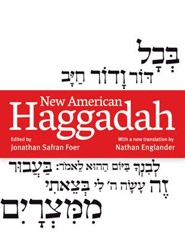By
– April 20, 2012
In the beginning was Maxwell House.
For tens of millions of Americans the Maxwell House haggadah — first published in 1934 to promote kosher-for-Passover coffee— was as much a part of the holiday as matza and gefilte fish. Its plain pipe-rack presentation was the requisite prelude to the culinary extravaganza that constituted the highlight of the evening. Over the past several decades, however, there has been a proliferation of haggadot centered on the meaning of the holiday and directed, like these new versions, at engaging all the participants in the seder. In addition to new haggadot, there are two new commentaries, with the full text of the seder, discussing the development and deepening the meaning of this most observed of Jewish rituals.
In A Night to Remember: The Haggadah of Contemporary Voices, the father and son team of Mishael Zion and Noam Zion draw every member of the family into the seder. The sequel to the lively and highly imaginative haggadah A Different Night (1997), A Night to Remember brings together games, songs, thoughtful quotations, varied color illustrations, and helpful suggestions and explanations that run alongside the traditional text. The format allows the leader to tailor the seder to all the participants, young and old. The emphasis on contemporary voices, from Rabbi Joseph Soloveitchik and Amos Oz to Toni Morrison and Leonard Cohen, underlines the universal message of the Exodus.
Richard and Liora Codor drew on their own very different seder experiences to create a haggadah for their family. Richard remembers horsing around with his cousins under the table while his uncle droned on; Liora drew on the spring festival that was part of her kibbutz seder. Although concise, Richard Codor’s Joyous Haggadah retells the full Passover story in a brisk narrative, incorporating explanations of the rituals as it goes along and capturing the festivity of the season. The cartoon-style illustrations and transliteration make this an excellent choice for families with young children. For the traditional- minded the minimal Hebrew may pose a problem.
Over the past five centuries it is estimated that 3,000 haggadot have been published, many memorable for the outstanding quality of their calligraphy and art. Haggadah Illuminated by Even Caredio and illustrated by Guglielomo Bigi Benajá follows this tradition. The elegant text, in Hebrew only, is decorated with rich illustrations inspired by medieval art. It is a delight to read for both the clarity of the text and the grace and joy of the illustrations.
A haggadah is only the beginning of the eight-day Passover celebration. With the dark of winter behind us and our homes fresh with spring air and spring cleaning, each night of the holiday can be enriched with stories for children and new dishes from a variety of traditions. Just check out the shelves at your local library or bookstore for ideas that you can make part of your Passover celebration and family traditions.
For tens of millions of Americans the Maxwell House haggadah — first published in 1934 to promote kosher-for-Passover coffee— was as much a part of the holiday as matza and gefilte fish. Its plain pipe-rack presentation was the requisite prelude to the culinary extravaganza that constituted the highlight of the evening. Over the past several decades, however, there has been a proliferation of haggadot centered on the meaning of the holiday and directed, like these new versions, at engaging all the participants in the seder. In addition to new haggadot, there are two new commentaries, with the full text of the seder, discussing the development and deepening the meaning of this most observed of Jewish rituals.
In A Night to Remember: The Haggadah of Contemporary Voices, the father and son team of Mishael Zion and Noam Zion draw every member of the family into the seder. The sequel to the lively and highly imaginative haggadah A Different Night (1997), A Night to Remember brings together games, songs, thoughtful quotations, varied color illustrations, and helpful suggestions and explanations that run alongside the traditional text. The format allows the leader to tailor the seder to all the participants, young and old. The emphasis on contemporary voices, from Rabbi Joseph Soloveitchik and Amos Oz to Toni Morrison and Leonard Cohen, underlines the universal message of the Exodus.
Richard and Liora Codor drew on their own very different seder experiences to create a haggadah for their family. Richard remembers horsing around with his cousins under the table while his uncle droned on; Liora drew on the spring festival that was part of her kibbutz seder. Although concise, Richard Codor’s Joyous Haggadah retells the full Passover story in a brisk narrative, incorporating explanations of the rituals as it goes along and capturing the festivity of the season. The cartoon-style illustrations and transliteration make this an excellent choice for families with young children. For the traditional- minded the minimal Hebrew may pose a problem.
Over the past five centuries it is estimated that 3,000 haggadot have been published, many memorable for the outstanding quality of their calligraphy and art. Haggadah Illuminated by Even Caredio and illustrated by Guglielomo Bigi Benajá follows this tradition. The elegant text, in Hebrew only, is decorated with rich illustrations inspired by medieval art. It is a delight to read for both the clarity of the text and the grace and joy of the illustrations.
A haggadah is only the beginning of the eight-day Passover celebration. With the dark of winter behind us and our homes fresh with spring air and spring cleaning, each night of the holiday can be enriched with stories for children and new dishes from a variety of traditions. Just check out the shelves at your local library or bookstore for ideas that you can make part of your Passover celebration and family traditions.
Additional Titles Featured in Review
Maron L. Waxman, retired editorial director, special projects, at the American Museum of Natural History, was also an editorial director at HarperCollins and Book-of-the-Month Club.





